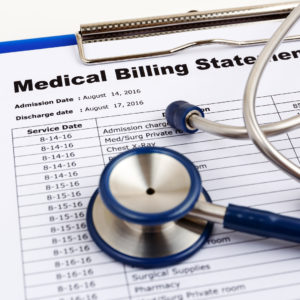The threat of a surprise medical bill could soon be a thing of the past.
Congress passed the No Surprises Act (NSA) last December as part of a $2.3 trillion spending package designed to address the COVID-19 pandemic. In its simplest form, the NSA protects “patients from receiving surprise medical bills resulting from gaps in coverage for emergency services and certain services provided by out-of-network clinicians at in-network facilities, including by air ambulances.” The bill ensures those receiving emergency treatments do not face unexpected out-of-network costs.
Surprise medical bills occur when out-of-network provider fees exceed what health insurance plans are willing to cover – the difference resulting in unexpected out-of-pocket expenses for patients. Between 2014 and 2017, it is estimated the average surprise medical bill could be anywhere from $220 to $628. The problem is particularly pronounced in emergency room visits and emergency surgeries as surprise bills reach an average of $19,600, and patients are often unable to select a provider.
Following the passage of NSA, the Department of Health and Human Services (HHS) announced a new rule to provide further patient protections against surprise bills. Under that newly issued rule, all emergency services will have to be treated as in-network and providers will be required to receive patient consent before they “receive care on an out-of-network basis” and before the “provider can bill at the higher out-of-network rate.”
For consumers, the new rule could provide financial security and the confidence to receive crucial medical care. A 2019 study found “66.5 percent of all bankruptcies” in the United States “were tied to medical issues,” particularly after receiving out-of-network care.
The consequences of bankruptcy for consumers are far-reaching. Aside from the negative social stigma associated with bankruptcy, consumers face a significant decline in their credit score, limiting access to credit cards and loans, as well as the prospect of losing their homes or life savings. For the 544,463 Americans who declared bankruptcy in 2020, their financial lives may never be the same again.
These statistics alone are alarming, but the fear of receiving out-of-network care is forcing thousands of Americans to delay receiving important medical care. A March 2020 study found one in four Americans avoided medical care because of the cost, with many citing the fear of receiving a surprise medical bill.
Delaying medical treatment ultimately leads to poorer, and avoidable, health outcomes. Not only can delaying medical care cause emotional distress, but “small problems can quickly progress when not properly treated in time.” Additionally, treating more complex medical conditions is far more expensive than treating simple conditions. Avoiding medical treatment, therefore, not only leaves patients facing worse health outcomes, but it might also leave them paying more in the long run.
Prohibiting surprise bills could benefit the broader economy by lowering the federal deficit. In its economic impact assessment, the Congressional Budget Office estimated that reforming surprise billing could reduce the federal deficit between $17.8 billion or $23.9 billion over 10 years.
Economic studies also suggest banning surprise billing could save Americans between 0.5 and 1 percent on their insurance premiums each year. While this may not sound significant, the extra cash would be welcomed for many Americans who face high insurance premiums, particularly those who do not receive insurance through their employer.
According to American Action Forum, these premium savings will occur because “providers would be expected to move toward the median in-network rate under the legislation and away from the average overall payment, which is higher generally.”
Recognizing the serious problem surprise billing poses to patients, a number of states have already taken steps to prohibit or severely curtail the practice. Currently, 12 states have some protections against the practice, while 17 have comprehensive protections. Unfortunately, this leaves 21 states that currently provide their patients no protections.
With the passage of the NSA and the new HHS rule, this patchwork of state rules will likely be eliminated, and the state of residence will no longer determine the level of protection from unexpected medical bills.
Of all the problems associated with U.S. healthcare, surprise billing is perhaps one of the most serious. Not only does it force thousands into medical bankruptcy, but it also leads thousands to skip important treatment for medical conditions, causing unnecessarily poor health outcomes. Recognizing the seriousness of the problem, Congress and the Department of Health and Human Services were right to step in and pass important reforms that will protect patients and guarantee them the financial security and confidence they deserve when seeking medical care.

